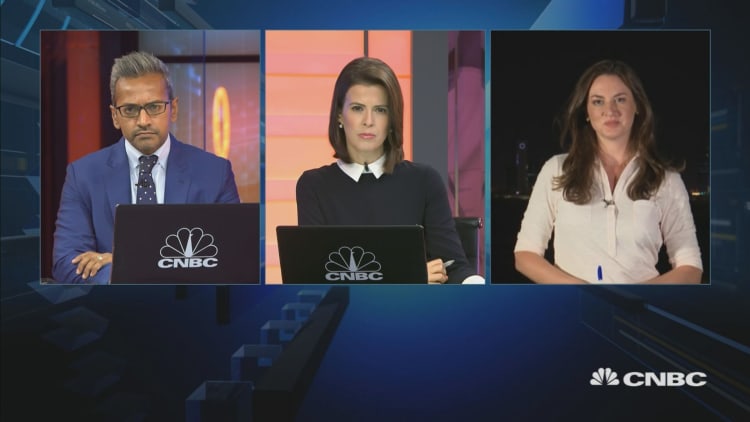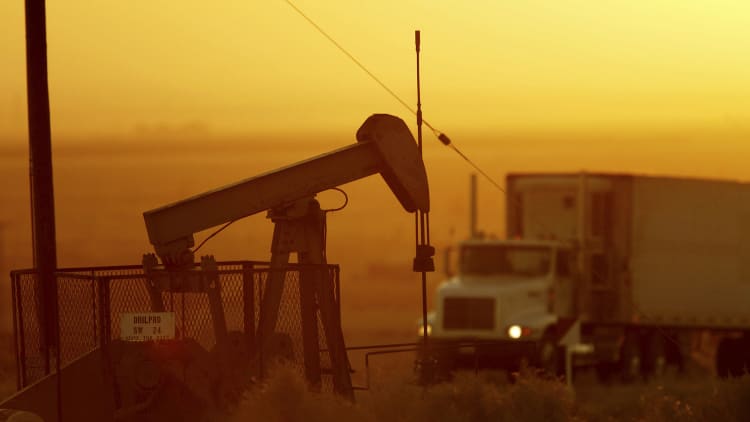
Oil prices could jump as much as $10 per barrel after a number of drone strikes hit the center of Saudi Arabia's oil industry, forcing the kingdom to cut its oil output in half.
Ten drones attacked an oil processing facility at Abqaiq and the nearby Khurais oil field on Saturday, causing a loss of 5.7 million barrels of crude production a day or 50% of the kingdom's oil output. Although it's still too early to tell the extent of the damage and how long the facilities will be shut down, oil analysts and traders told CNBC the impact on the commodity's price could be in the double digits.
"This is a big deal," said Andrew Lipow, president of Lipow Oil Associates. "Fearing the worst, I expect that the market will open up $5 to $10 per barrel on Sunday evening. This is 12 to 25 cents per gallon for gasoline."
Kevin Book, head of research at Clearview Energy, said the price impact will depend on the repair time which can take weeks to months.
"Our baseline assumptions, which incorporate public assessments of strategic petroleum reserve capacity and OPEC spare capacity, imply a net shortfall of ~1 MM bbl/d, or at least a ~$6/bbl premium to the ~$60 Brent close," Book said in a note. "Exclusive of this supply offset, and assuming a three-week shutdown, our models imply ~$10/bbl of upside."
U.S. West Texas Intermediate (WTI) crude futures settled 0.4% lower at $54.85 on Friday, and Brent crude futures traded 0.2% lower at $60.25 per barrel.
The impact might be smaller than expected as Aramco is now reportedly aiming to restore by Monday about a third of its crude output.
Saudi Aramco President and CEO Amin Nasser said Saturday nobody was hurt in the attacks and emergency crews have contained the fires and brought the situation under control.
"Work is underway to restore production and a progress update will be provided in around 48 hours," Nasser said.
Yemen's Houthi rebels have claimed responsibility for the attack, one of their largest attacks ever inside the kingdom. The Houthis have been behind a series of attacks on Saudi pipelines, tankers and other infrastructure in the past few years as tensions rise among Iran and the U.S. and partners like Saudi Arabia.
"Assuming damage light, the next big question is where the drones came from," said Bob McNally, president at Rapidan Energy Group. "If Iraq, then oil will go up more than a few dollars. And if Abqaiq kills talks of easing sanctions and the discussion turns to retaliation and escalation, I think oil could easily trade higher by $10 or more."
Saudi Energy Minister Abdulaziz bin Salman said Saturday the kingdom will compensate part of the production to its customers from its reserves.
"Considering the implications of a direct hit on this Saudi Arabian facility, my guess is at least $5 with the potential for much, much more," said Kyle Cooper, IAF Advisors Director of Research. "If I were short, I'd buy the first offer I see."
Roberto Friedlander, Seaport Global's head of energy trading, said depending on the timing of a turnaround, the oil could gain $10 per barrel.
"If it is a few days, the Saudis are working to restore production and will provide more information in the next 48 hours, the impact is more likely to be $3-5 to Crude," Friedlander added.
—CNBC's Fred Imbert and Patti Domm contributed reporting.

Correction: A previous version of this story misspelled Roberto Friedlander's last name.


